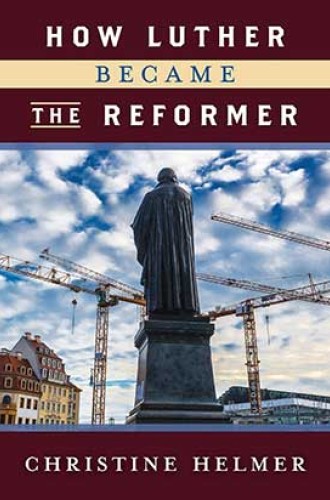The unmodern Luther
Christine Helmer threatens to dash to pieces the pieties of modern Luther scholarship.
A flood of publications accompanied the 500th anniversary in 2017 of Martin Luther’s 95 theses. In many respects, this new literature only perpetuated the existing tropes of the so-called Luther Renaissance of the early 20th century. These tropes are the starting point for Christine Helmer’s analysis.
Whether viewed as hero or villain, the iconic Luther has been the lonely and brave (or foolhardy) existentialist who battled deep doubts about God’s existence and lethal threats from pope and emperor for the sake of his people’s emancipation. Facing death, he sacrificed himself to the call of conscience and a religious experience of strangely severe and inscrutable grace. This biographical event constituted a breakthrough: Luther reformed not merely or even chiefly medieval Catholicism, but religion itself.
Read our latest issue or browse back issues.
In this way, “Luther the reformer” emerged for postwar Germans in the 1920s as the origin of a new way of being religious: resisting rationalization and institutionalization, confined no longer to dogma or church, and providing a personal paradigm for religion in the iron cage of the modern world.
The father of the Luther Renaissance, Karl Holl, comes under special scrutiny in Helmer’s book. She both exposes Holl’s personal proclivity to fascism and dissects how his portrait of Luther helped to “fund” or legitimize fascism’s political theology of sacrifice. She takes fascism to be the dark side of modernity, its endemic possibility.
Helmer threatens to dash to pieces the pieties of modern Luther scholarship. Not only does she reassert the historical Luther as a Catholic aiming to reform Catholicism, but she finds in this historical Luther an important theological resource for confronting today the dark side of the modernity Holl championed.
Reading Helmer’s book, one can well imagine the squirming of the historians who dominate Luther research and assuredly do not like their hermeneutics subjected to critical scrutiny by—of all things—a systematic theologian. But who else will guard the guardians? Damning the torpedoes, Helmer speeds full head to the dilemma faced by theologians as they navigate between dual temptations: either resist the sovereign self of Cartesian-Kantian modernity at the expense of being marginalized as a reactionary, or bless the titanism of modernity at the cost of losing the theme of the sovereignty of God advancing in the improbable way of the merciful Jesus Christ.
Helmer shows how difficult it would be to enlist the Catholic Luther—who observed that “man wants to be God and does not want God to be God”—to the anthropocentrism of modernity. Yet the Luther Renaissance undertook precisely this herculean task by making Luther’s notion of the hidden God the backdrop for the irreducible religious experience of being called to heroic self-sacrifice. Helmer explains: “As paragon of the ‘religious personality,’ Luther stands before the wrathful God and lives.”
From her feminist perspective, Helmer pinpoints an especially toxic theme in this tradition: the idea that if one loves God for God’s sake, and not selfishly, one would be willing to be damned to the glory of God. Here odium sui (self-hatred) is made the insignia of the genuine Christian.
For both Augustine and the historical Luther, it was Christ who was willing to be damned to display the glory of God’s love for sinners. Accordingly, in Christ the Christian comes to “hate” with holy love the perverted self who uses God for ungodly purposes. This hatred is for the sake of the new self graciously bestowed in Christ by the Holy Spirit.
In the Luther Renaissance, Helmer points out, this eschatological dimension of faith becomes reduced to the categorical imperative to do one’s duty in spite of any personal inclinations to do otherwise. Recall Hannah Arendt’s analysis of Nazi leader Adolf Eichmann, who suppressed humane feelings for certain Jews in order to do his duty as their executioner.
For the Catholic Luther and his model Augustine, in contrast, all human beings by nature seek the good. The question is not whether one works for good, but what works are truly good works.
Helmer devotes a significant but perplexing chapter to “the test case of anti-Judaism.” It’s an exploration of Luther’s anti-Judaism, which Helmer finds “running consistently and inexorably through the entire corpus” of his writings. She locates within his Catholic inheritance “a long history of medieval precedents and anti-Jewish biblical interpretations, doctrinal articulation, and polemic.” Side-by-side with this analysis of “oppositional thinking” in traditional Christian theology, Helmer offers an equally nuanced analysis of how “in the context of fascism, the anti-Jewish expressions in Luther’s biography erupted into the reality of a political anti-Semitism.”
To be convincing, however, this analysis needs more precision. What exactly is (religious) anti-Judaism and how exactly does it differ from (racialist) anti-Semitism? Helmer gestures toward understanding anti-Judaism as rooted in antinomian versions of the doctrine of justification and dialectical accounts of the relationship of law and gospel. But this gesture ill comports with the previously established historical location of anti-Judaism within the medieval tradition against which Luther ostensibly articulated his doctrine of justification.
In fact there are a bewildering number of different forms of anti-Judaism. Moreover, in Nazi anti-Semitism Jews served as a double-sided trope. They were portrayed both as ancient institutionalized religiosity-cum-legalism from which Christianity had freed humanity and as the prime example of modern, freethinking cosmopolitanism which deracinated the Volk, severing the people from their roots in blood and soil. These varieties and their combinations need to be sorted out. Helmer exposes how liberal theology’s quest for innovative religious personality both obscures and exculpates the historical Luther’s specific sins against Jews.
To make the same point from another angle: one has to wonder about the historical causality Helmer seems to attribute to the Luther Renaissance in “funding” Nazism. In a summary statement she writes: “the irony is that Holl’s grand modern ethos paved the way for a nationalist political theology. . . . An exceptional ethic, driven by love, was used to legitimate the exceptionalism that identified the National Socialists’ defiance of all cultural institutions designed to protect their versions of freedom and justice.” Here the funding is characterized as an unintended consequence, an irony. So the question arises: What is “exceptional” about this development if it is indeed something endemic—the dark side of the modernity which liberal theology otherwise uncritically championed?
A version of this article appears in the print edition under the title “The unmodern Luther.”







